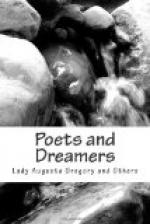’Lonely antagonists
of destiny
That went down scornful under
many spears;
Who soon as we are born are
straight our friends,
And live in simple music,
country songs,
And mournful ballads by the
winter fire.’
In this simple lament, the type of a great many, only the first name of the young man it was made for is given: ‘Fair-haired Donough.’ It is likely the people of his own place know still to what family he belonged; but I have not heard it sung, and only know that he was ’some Connachtman that was hanged in Galway.’ And it is clear it was for some political crime he was hanged, by the suggestion that if he had been tried nearer his own home, ‘in the place he had a right to be,’ the issue would have been different, and by the allusion to the Gall, the English:—
’It was bound fast here
you saw him, and you wondered to see him,
Our fair-haired Donough, and
he after being condemned;
There was a little white cap
on him in place of a hat,
And a hempen rope in the place
of a neckcloth.
’I am after walking
here all through the night,
Like a young lamb in a great
flock of sheep;
My breast open, my hair loosened
out,
And how did I find my brother
but stretched before me!
’The first place I cried
my fill was at the top of the lake;
The second place was at the
foot of the gallows;
The third place was at the
head of your dead body
Among the Gall, and my own
head as if cut in two.
’If you were with me
in the place you had a right to be,
Down in Sligo or down in Ballinrobe,
It is the gallows would be
broken, it is the rope would be cut,
And fair-haired Donough going
home by the path.
’O fair-haired Donough,
it is not the gallows was fit for you;
But to be going to the barn,
to be threshing out the straw;
To be turning the plough to
the right hand and to the left,
To be putting the red side
of the soil uppermost.
’O fair-haired Donough,
O dear brother,
It is well I know who it was
took you away from me;
Drinking from the cup, putting
a light to the pipe,
And walking in the dew in
the cover of the night.
’O Michael Malley, O
scourge of misfortune!
My brother was no calf of
a vagabond cow;
But a well-shaped boy on a
height or a hillside,
To knock a low pleasant sound
out of a hurling-stick.
’And fair-haired Donough,
is not that the pity,
You that would carry well
a spur or a boot;
I would put clothes in the
fashion on you from cloth that would be
lasting;
I would send you out like
a gentleman’s son.
’O Michael Malley, may
your sons never be in one another’s company;
May your daughters never ask
a marriage portion of you;
The two ends of the table
are empty, the house is filled,
And fair-haired Donough, my
brother, is stretched out.




